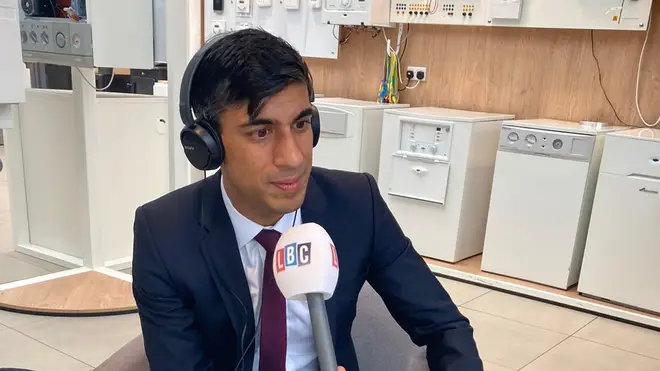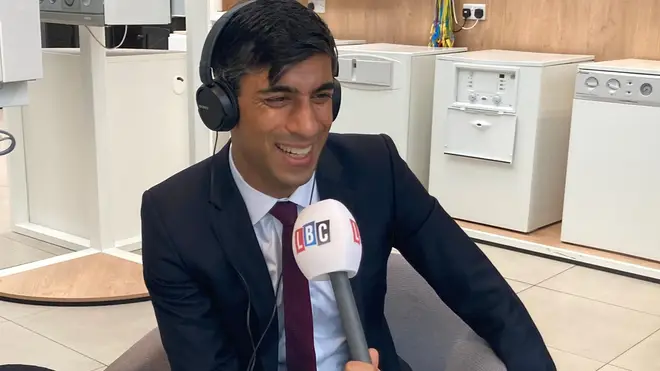
Clive Bull 1am - 4am
9 July 2020, 09:00

The Chancellor has told LBC that he does not have a "crystal ball" to predict what might happen with the economy if a second wave of coronavirus hits the UK.
Rishi Sunak said he is prepared to make “difficult decisions” when asked about tax rises as the UK recovers from coronavirus lockdown.
Speaking to LBC’s Nick Ferrari, the Chancellor said we “obviously can’t live like this” while discussing public finances amid huge recovery packages to stimulate the economy.
READ MORE: How does the chancellor's 'eat out' voucher scheme work
Asked whether tax rises would be necessary to help pay for that, he said: “You’re right, of course we need to make sure we have sustainable public finances.
“I think I would differentiate between the things we do this year that are one-off and time limited to help, in the first instance, protect people’s jobs, but also protect the long-term damage on our economy.

Nick Ferrari asks Chancellor if UK can expect tax rises
“I think those are the right things to do so that the long-term damage is minimised.
“Over the medium term, we obviously can’t live like this, everyone appreciates that, and we’ll have to return our public finances to a sustainable position over a reasonable period of time, that’s the right thing to do for the economy, not least, as we’ve seen, because things come along, and we need to be able to have the strength to respond to them.
“I will make the decisions that are required, difficult as they may be, to do that.
“I think it’s too early to say exactly what the shape of our recovery looks like, the time period over which that should happen and how it should happen, so I wouldn’t want to speculate now, but people should know I am very committed to making sure that we do that and I'm unafraid to make whatever difficult decisions are required."
When asked again about tax increases, he said: "I wouldn't want to speculate on the shape of the future.

"We all want to see strong public finances. This is hopefully a one-off situation that's required a particular response to try and minimise the damage.
"Once we get through it and we're more back to normal then we need to have more normal public finances over time.
"That won't obviously happen overnight, this will take a little bit of time to recover from, but over time we need to get back to a sustainable position."
The Chancellor's summer statement on Wednesday saw the bill for tackling the coronavirus crisis rise to £190 billion, according to treasury figures.
Mr Sunak's statement contained the potential for £30 billion of extra spending on top of almost £160 billion already committed to dealing with the coronavirus emergency - a figure far higher than previously estimated - and there is little indication of how the Treasury intends to pay for it.

VAT to be cut to 5% for hospitality businesses
The Chancellor, in what amounted to a mini-Budget, told MPs in the Commons that the Government will do "all we can" to keep people in work.
He announced that firms which have furloughed staff will be given a £1,000 bonus to keep workers in jobs, a move designed to help protect livelihoods after the economy contracted by 25% in just two months.
Mr Sunak's intervention comes after warnings from the Organisation for Economic Co-operation and Development (OECD) that the UK's unemployment rate could soar to 14.8%, with job losses comparable to the 1930s.

"The Chancellor may come to regret parts of his Summer Statement"
Unveiling announcements in a "plan for jobs", Mr Sunak also:
- Announced an "eat out to help out" plan for dining out in August to boost the hospitality sector, with a 50% discount per head from Monday to Wednesday up to a maximum discount of £10 per diner.
- Slashed VAT on food, accommodation and attractions from 20% to 5% from July 15 until January 12, a tax cut worth up to £4 billion.
- Confirmed plans to abolish stamp duty on properties up to £500,000 in England and Northern Ireland under a temporary measure lasting until March 31 2021.
- Set out a scheme for firms to be given £2,000 for each new apprentice they hire under the age of 25 and a new bonus of £1,500 for apprentices over that age.